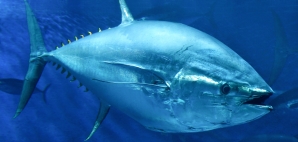Oceans
Research Area block
Humans depend on the ocean to help stabilize the climate, provide food and support livelihoods.

Stanford Woods Institute researchers are finding ways to meet challenges facing ocean health by applying the best available science and policy expertise to ocean governance, ecosystem resilience, climate change impacts such as ocean acidification and sea level rise and other stressors to marine environments.
Research Centers and Programs

Center for Ocean Solutions »
The Center for Ocean Solutions (COS) is a collaboration among Stanford University (through the Stanford Woods Institute and the Hopkins Marine Station), the Monterey Bay Aquarium and the Monterey Bay Aquarium Research Institute (MBARI). COS develops knowledge to solve ocean challenges.

Natural Capital Project »
The Natural Capital Project melds world-class research on environmental economics with influential conservation programs. The center’s Integrated Valuation of Environmental Services and Tradeoffs (InVEST) software suite enables decision-makers to quantify nature’s values, assess tradeoffs associated with alternative land- and water-use choices and integrate conservation and human development into land- and...
Other Research Centers and Programs
Environmental Venture Projects
Using Large Marine Protected Areas to Recover Highly Productive Marine Ecosystems and the Services They Provide: the Case of the Adriatic Sea »
Fishing practices that use gear that is dragged on the seafloor, such as bottom trawling, destroy and degrade marine habitats on continental shelves, the most productive areas of the global ocean. However, there has been little assessment of the outcomes of trawling restrictions, impeding progress towards solutions. This project will...
View More Environmental Venture Projects For This Research Area
Realizing Environmental Innovation Program
News & Press Releases

The unique system of hydraulic control of fins discovered in tuna indicates a new role for the lymphatic system in vertebrates. This natural mechanism may inspire designs for new "smart" control surfaces with changeable shape and stiffness for both air and underwater unmanned vehicles.
By Taylor Kubota,
View More News & Press Releases
Media Coverage
A Beach Town’s Dilemma: Protect Homes or Save the Shore? »
Katharine Mach is quoted on the issues arising from the Del Mar walkable beach
By Anne C. Mulkern,
Publications
Published Work
A Novel Cardiotoxic Mechanism for a Pervasive Global Pollutant »


